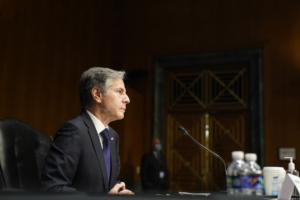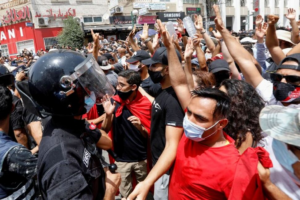
The National Interest Foundation Newsletter
Issue 112, September 16, 2021
Welcome to our NIF Newsletter. In this week’s headlines: U.S. House Speaker Nancy Pelosi voices deep concern about the Saudi Arabian regime’s torture of humanitarian aid worker Abdulrahman al-Sadhan, Secretary of State Antony Blinken testifies in front of Congress regarding the shortcomings of the United States’ withdrawal from Afghanistan, and Tunisian President Kais Saied faces backlash from pro-democracy advocates over his plans to amend the country’s constitution.
Saudi Regime’s Torture of Aid Worker

Pelosi has previously warned Saudi authorities that the U.S. Congress is closely monitoring human rights abuses. (Photo from AP)
U.S. House Speaker Nancy Pelosi Voices Deep Concern About the Saudi Arabian Regime’s Torture of a Humanitarian Aid Worker
Over this past weekend, U.S. House Speaker Nancy Pelosi (D-CA) expressed serious concern with the Saudi Arabian regime’s imprisonment and torture of aid worker Abdulrahman al-Sadhan. In a tweet, Pelosi highlighted that his arbitrary sentencing demonstrates Saudi authorities’ blatant assault on freedom of expression in the country, and that Congress would continue to monitor the viable accusations of torture and human rights violations in al-Sadhan’s case and others. Abdulrahman al-Sadhan was detained in Saudi Arabia back in March of 2018 and unjustly sentenced to 20 years in prison and a 20-year travel ban for allegedly running an anonymous social media account that criticized the Saudi royal family and government. Credible reports have emerged detailing al-Sadhan’s torture and abuse at the hands of Saudi authorities, which includes beatings, electric shocks, and threats of being killed. Pelosi has referred to the case as a brutal and appalling injustice, and stated that she is deeply disturbed by the long record of human rights abuses committed by the Saudi regime. Crown Prince Mohammed bin Salman has engaged in a sweeping crackdown to repress dissent, and al-Sadhan is one of scores of Saudi citizens that have been unlawfully detained as a part of these efforts.
Blinken Testifies on Afghanistan Withdrawal

Secretary of State Blinken offered testimony this week on the Biden administration’s withdrawal from Afghanistan. (Photo from Los Angeles Times)
Secretary of State Blinken Testifies in Front of Congress Regarding the Shortcomings of the United States’ Withdrawal from Afghanistan
U.S. Secretary of State Antony Blinken testified this week before both the House Foreign Affairs Committee and the Senate Foreign Relations Committee regarding the Biden administration’s withdrawal from Afghanistan. The manner and handling of the recent U.S. troop pullout back in late August was met with a significant amount of bipartisan criticism, and committee members questioned him about the shortcomings of the strategy’s execution. Blinken calmly and adamantly defended the administration’s actions, stating that officials began planning for a potential “worst-case scenario” during the spring and summer. He laid blame at the feet of former President Trump, expressing that the Biden administration inherited a deal and deadline but no competent plan in order to carry out the withdrawal. Blinken’s testimony also focused on the issue of Afghan refugees and American allies still in Afghanistan moving forward, with the Secretary of State providing a methodical explanation of the State Department’s plans to expedite visa and asylum processes. Senator Bob Menendez (D-NJ), Chairman of the Senate Foreign Relations Committee, voiced his disapproval over some top Biden officials refusing to testify and threatened to subpoena them, notably singling out Secretary of Defense Lloyd Austin. All told, it appears from the great deal of attention given to the testimony on the subject that the manner of the Afghanistan withdrawal will continue to be something that Biden administration officials are required to answer for.
Saied’s Plans to Amend Constitution

Pro-democracy advocates in Tunisia have criticized Saied’s intention to amend the country’s constitution. (Photo from Reuters)
Tunisian President Saied Faces Backlash from Pro-Democracy Advocates Over His Plans to Amend the Country’s Constitution
During the preceding week, President Saied of Tunisia appeared on television in a live address to announce his intent to amend the country’s constitution. Pro-democracy advocates and critics of the planned move have expressed opposition to it, stating that it signals Saied’s goal is to consolidate power and remain in office with little to no political competition. Many have pointed to it as further proof of a coup, and also condemn Saied’s attempts to limit and negate the parliament’s authority which they rightfully fear may send Tunisia regressing back towards authoritarian rule. Additionally, there is debate over the mere legality – or lack thereof – of Saied’s behavior, as some analysts contend that he is simply using the socioeconomic unease in the country as a means to tighten his grip on power. As one of the beacons of democratic hopes in the region, the manner in which events unfold in Tunisia could have major implications and therefore observers are keeping a close eye on how the crisis ultimately transpires.
